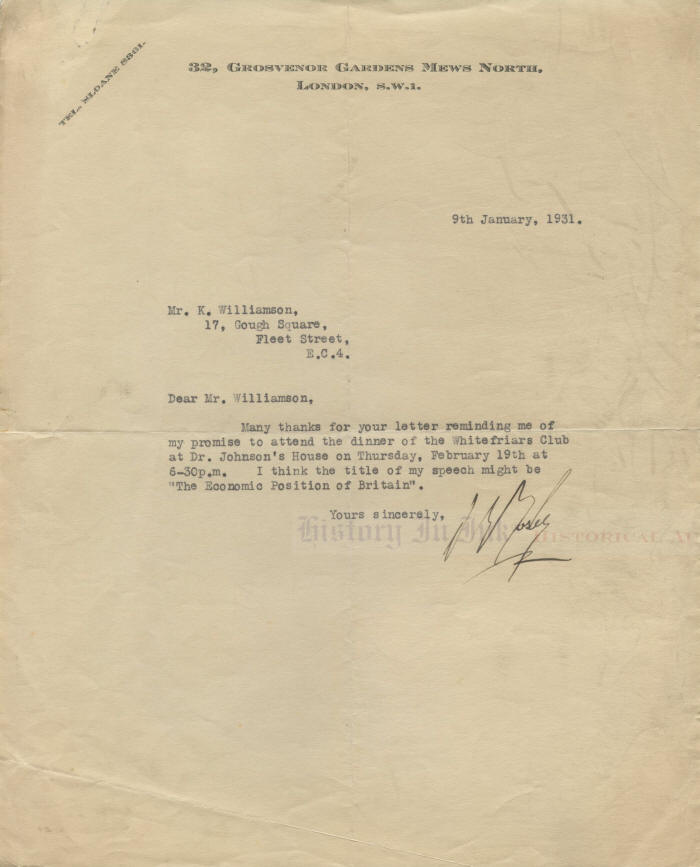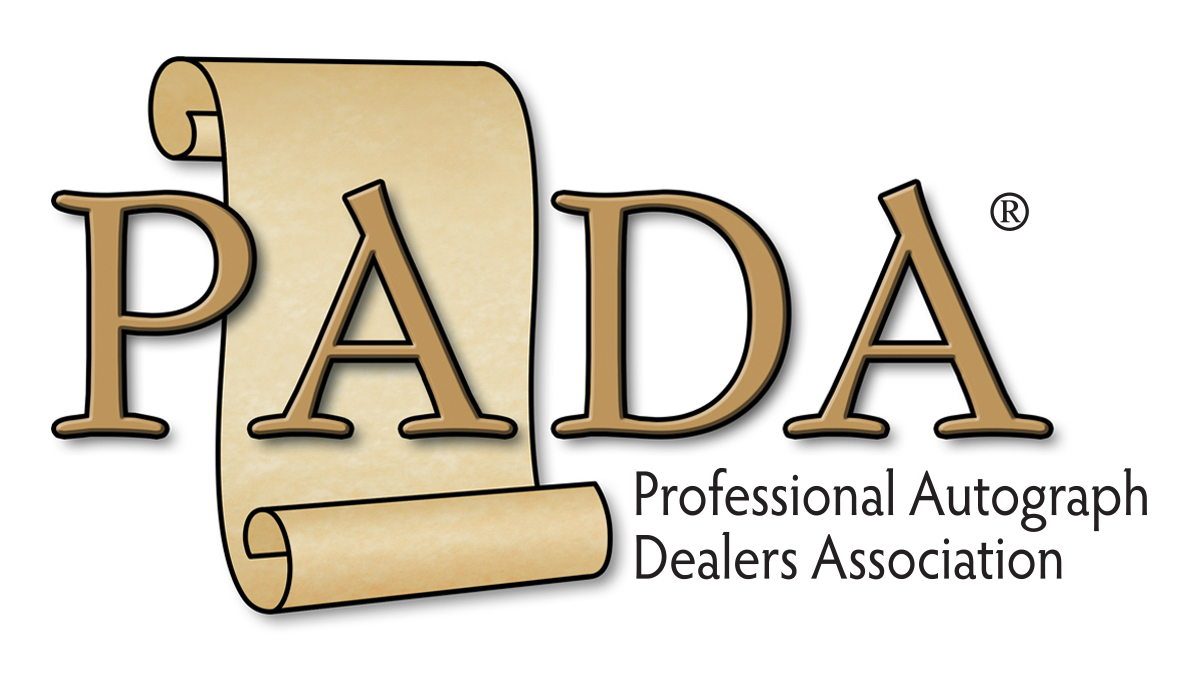2214513
Oswald Mosley
Scroll down to see an image of the item below the description
In the midst of the Great Depression, Mosley says that he may speak on “The Economic Position of Britain”
Sir Oswald Ernald Mosley, 6th Baronet, 1896–1980. British politician; Member of Parliament, 1918–1931; Chancellor of the Duchy of Lancaster, 1929–1930; founder of the British Union of Facists. Typed letter signed, O. E. Mosley, one page, 8” x 10”, on stationery of 32, Grosvenor Gardens Mews North, London, [England], January 9, 1931.
Mosley was a controversial figure in Britain in the 1930s. A member of Parliament for both Harrow and Smethwick, he became dissolusioned with mainstream politics and turned fascist. He formed the British Union of Fascists in 1932.
Britain was mired in the Great Depression, or the “Great Slump,” when Mosley wrote this letter in 1931. Britain’s economic downturn followed from the beginning of the Great Depression in the United States in 1929. Since Britain had not experienced the economic boom that the United States, Germany, and other countries experienced in the 1920s, the effect of the depression did not seem as stark in Britain. Still, British world trade fell by half between 1929 and 1933, its heavy industrial output fell by a third, and by 1932 it had 3.5 million registered unemployed and more who had only part-time employment.
It was in this atmosphere that Mosley wrote this letter suggesting that he would speak on the Britain’s world economic position. He writes, in full: “Many thanks for your letter reminding me of my promise to attend the dinner of the Whitefriars Club at Dr. Johnson’s House on Thursday, February 19th at 6-30p.m. I think the title of my speech might be ‘The Economic Position of Britain’.”
The Whitefriars Club, founded in 1868, is a literary dining club, one of the oldest in London. It counted Winston Churchill among its members. It meets periodically throughout the year and invites prominent cultural or political figures to speak about their careers or about important issues of the day.
Mosley spoke to the Whitefriars Club twice, both before he turned Fascist. The Club’s website shows that he spoke at Dr. Johnson’s house on December 4, 1930, and again this time, on February 19, 1931. Others who have spoken to the Club more than once include notables such as H. G. Wells, George Bernard Shaw, and Mark Twain.
Mosley’s oratorical skills were impeccable. He spoke in Parliament without notes. The liberal Westminster Gazette called him “the most polished literary speaker in the Commons.” It said that “words flow from him in graceful epigrammatic phrases” and that to “listen to him is an education in the English language, also in the art of delicate but deadly repartee. He has human sympathies, courage and brains.”
Mosley became one of the youngest members of Parliament after World War I. In 1924, he came within 100 votes of defeating Neville Chamberlain to represent Birmingham Ladywood. It would be Chamberlain who would later become the Prime Minister who appeased Adolf Hitler at the Munich Conference in September 1938 and then naively declared that he had achieved “peace for our time.” Mosley returned to Parliament in 1926 and served as the Chancellor of the Duchy of Lancaster, the highest-ranking member of the cabinet behind the Prime Minister, in the Labour government from 1929 to 1931. Although some saw Mosley as a future Prime Minister, Mosely resigned over differences with the government over unemployment practices.
Mosley formed the British Union of Fascists in 1932 and sought alliances with Hitler and Italy’s Benito Mussolini. He was imprisoned in 1940, and the British Union of Fascists was banned. He was released from prison in 1943. He attempted a political comeback in the 1950s, but he received little support. There is more information about Mosley in Susan Ronald, Hitler’s Aristocrats: The Secret Power Players in Britain and America Who Supported the Nazis, 1923–1941 (2023).
In 1928, Mosley succeeded his father as the 6th Baronet Mosley, a title that his family had held for more than a century. The term “baronet” was created by King James I in May 1611 as a means of raising funds for the crown. A baronetcy is not part of the British peerage, and the position of baronet is not an order of knighthood. A baronet or baronetess, who is addressed as “Sir” or “Dame,” is lower than a baron or baroness, who is addressed as “Lord” or “Lady.” There are approximately only 1,200 baronets left in the United Kingdom. One may accede to the position of baronet by proving succession to the satisfaction of the Lord Chancellor and Secertary of State for Justice. Historically, there have been only four baronettesses. Generally, baronetcies usually descend through the male heirs of the body of the grantee, although a creation of a baronetcy with a special remainder can allow the baronetcy to be inherited by women. Only one baronetcy has been created since 1965: for Sir Denis Thatcher, the husband of former Prime Minister (and later Baroness) Margaret Thatcher, on December 7, 1990. Upon his father’s death in 2003, the Thatchers’ son, Mar, succeeded as 2nd Baronet.
This letter is in fine condition. Mosley has signed in black fountain pen. The letter is uniformly toned. It has intersecting mailing folds, not affecting the signature; a diagonal fold across lower left blank corner; a paper clip impression and stain at upper left former; and scattered light markings, particularly at right.
Unframed.








